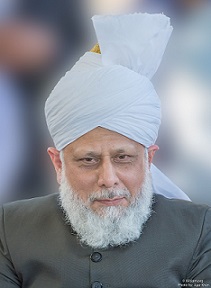After reciting Tashahhud, Ta’awwuz and Surah al-Fatihah, His Holiness, Hazrat Mirza Masroor Ahmad(aba) said that these days, while there are some benefits to social media, there are other aspects which are harmful. Opponents of the Ahmadiyya Muslim Community take advantage of this and use foul language against the Community.
Responding to Allegations in the Right Manner
His Holiness(aba) said that they speak such lies and atrocities against the Promised Messiah, Hazrat Mirza Ghulam Ahmad(as) that they injure the hearts of Ahmadis. Some Ahmadis then also respond in an unbecoming manner, however pure their intentions may have been. This is not our practice and an Ahmadi should abstain from using any sort of ill speech or responding in a manner where we use such words that could in any way, shape or form become derogatory towards someone else, which then the opponents could misconstrue to say that God forbid, we dishonour the Holy Prophet(sa) and his companions. Whereas the esteemed rank and status that we give to the Holy Prophet(sa) and his companions cannot be fathomed by these people.
His Holiness(aba) said that everything we are and have is sacrificed for the Holy Prophet(sa). He is the Seal of Prophets who is the beloved of God. Regarding his companions, the Promised Messiah(as) has spoken so highly of them as can never be matched by our opponents. Hence, every Ahmadi should bear this in mind and they should avoid saying anything that could lead to any sort of misconception or even the possibility of a misconception.
His Holiness(aba) said that upon responding in an unbecoming manner, some Ahmadis might say that they have exhibited great honour. However, this so-called honour is in fact ignorance. If an Ahmadi speaks in a manner that can lead to any sort of erroneous meanings, then that person in fact dishonours the Promised Messiah(as) and the Community.
The Example of Patience Established By the Promised Messiah(as)
His Holiness(aba) quoted the Promised Messiah(as) who enjoined that we must show patience. He said that people cursed at him, but he would not care about this, nor feel sorry for such people, because the reality was that they had nothing of substance to say, hence they resort to cursing. The Promised Messiah(as) said that they could exhaust all their efforts against him and in the end they would see who prevails. The Promised Messiah(as) advised his Community that just as he did not respond to those who cursed at him, his Community should also abstain from responding to cursing with cursing, as this would remove any blessings. Anger and passion cause darkness to cloud one’s mind, which can only result in darkness.
His Holiness(aba) said that today, people become self-proclaimed scholars on social media and start responding to non-Ahmadis and clerics; however, Ahmadis should stay away from this. If a response is required, then they should consult with the scholars and knowledgeable people of the Community, so that such responses can be given that are truly strong and can refute the allegations. They should act in accordance with the teachings of the Promised Messiah(as), which are the true teachings of Islam. Acting contrary to this would be a source of dishonouring the Community.
His Holiness(aba) prayed that may Allah protect us from the ploys of evil. May He grant sense to those who show false ‘honour’ and end up using such language that sparks the spread of chaos and disorder. If, instead of responding in this manner on social media, we were to prostrate before Allah the Almighty, if we offer our prayers with care, if we adopt such pain in our prostrations which stirs the honour of God, then we will quickly attain much better results than the results people seek to attain by responding themselves. Hence, every Ahmadi must be cautious against this, and never utter such words that needlessly give our opponents the opportunity to raise objections to what an Ahmadi has said.
His Holiness(aba) said that we must have the loftiest standards of morals. One who does not have high morals does not honour their pledge of allegiance to the Promised Messiah(as). Hence, everyone must analyse themselves, and rather than responding in an unbecoming manner, they should focus on prayers. His Holiness(aba) prayed that may Allah enable everyone to do so. May the evil of the opponents be turned back against them and may Allah protect against them.
Summary prepared by The Review of Religions


